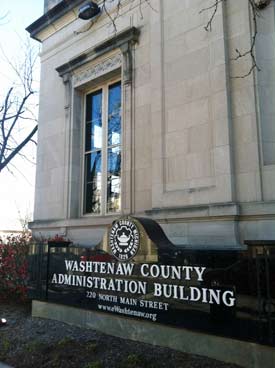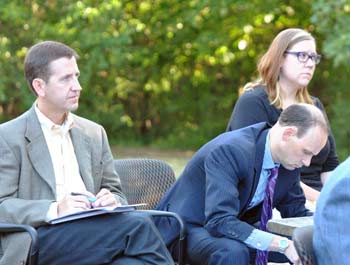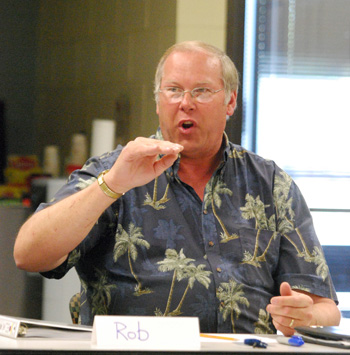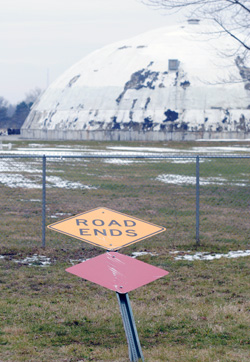Washtenaw County board of commissioners – animal control policy task force meeting (Sept. 13, 2012): With five of 11 county commissioners present, a task force for developing policies on the county’s animal control services thrashed through a list of recommendations to make to the full board, possibly at its Sept. 19 meeting.
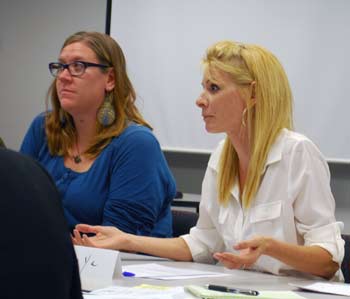
From left: Jenny Paillon, director of operations for the Humane Society of Huron Valley, and HSHV executive director Tanya Hilgendorf. They were attending a Sept. 13, 2012 meeting of the county’s animal control policy task force.
But at the end of the two-hour task force session, commissioners also opened the door to start direct negotiations with the Humane Society of Huron Valley, rather than pursuing a request for proposals (RFP) from other vendors. For many years HSHV has held the contract to provide services to the county, including those that are state-mandated. Its current contract expires on Dec. 31, 2012. Key points of contention have been the amount that the county is willing to pay for animal control services, both mandated and non-mandated, and how much those services actually cost.
In advocating for negotiations with HSHV, Rolland Sizemore Jr. expressed concern that if the board pursues the RFP process, a service provider won’t be lined up by the end of this year. Then the county will be in the same position it was in the beginning of 2012 – scrambling to get a new contract. He also pointed out that if the county issues an RFP and no other organizations respond, then the HSHV will have more leverage over the county “because they’ll know we’re screwed.”
Tanya Hilgendorf, HSHV’s executive director, supported starting contract negotiations. She attended the Sept. 13 meeting and praised the work of the task force as well as a separate group led by sheriff Jerry Clayton, which has been analyzing costs for animal control services. People are more informed than they were when this process began in May, she said, adding that there was more trust between the county and HSHV, too.
At least one commissioner, Barbara Bergman, had explicitly stated earlier in the meeting that she didn’t trust HSHV yet. She said the last time that the county had trusted HSHV, commissioners didn’t get good data about the services that were being provided, and the cost of those services. Bergman – who had left the meeting by the time a suspension of the RFP process was discussed – has been a strong advocate for curbing costs related to animal control, in favor of funding programs for human services.
The task force reached consensus on eight recommendations for animal control services to include in an RFP, or for a contract with HSHV. Those include licensing all dogs at the point of adoption or recovery, holding all stray animals for the minimum number of days required by law, and providing animal cruelty investigations.
The group also reached agreement on broader policy recommendations, including several longer-term goals: creating a civil infractions ordinance and fee structure for unlicensed dogs, and working with local units of government to create a unified, countywide dog licensing program. Currently three other jurisdictions – Ann Arbor, Ypsilanti and Ypsilanti Township – have their own dog licensing programs, with varying fee levels.
Several other changes might be proposed in the future. Hilgendorf offered to draft language for an ordinance prohibiting ownership of certain types of exotic animals. She also hoped that commissioners eventually would consider an anti-chaining ordinance and spay/neuter ordinance – “even if it’s just for pit bulls,” which has worked well in Ypsilanti Township, she said. [The township has an ordinance requiring that pit bulls must be spayed or neutered.] Hilgendorf also suggested addressing the issue of feral cats, which are a problem in some parts of the county. HSHV already operates a “trap, neuter, return” program aimed at curbing the feral cat population.
When the task force was formed earlier this year, it were given a deadline of Oct. 15 to bring recommendations to the full board. It’s likely that will happen sooner, possibly at the board’s Sept. 19 meeting. As of Sept. 16, however, there was no agenda item for these recommendations on the board’s ways & means committee agenda or the regular board agenda.
The relationship between HSHV and the county has a long, complex history. For additional background, see ”Next Steps on Animal Control Policy,” “Work Continues on Animal Control Policy,” and ”Revenue Options Eyed for Animal Control.” More information related to this process is also posted on the county’s website. [Full Story]





